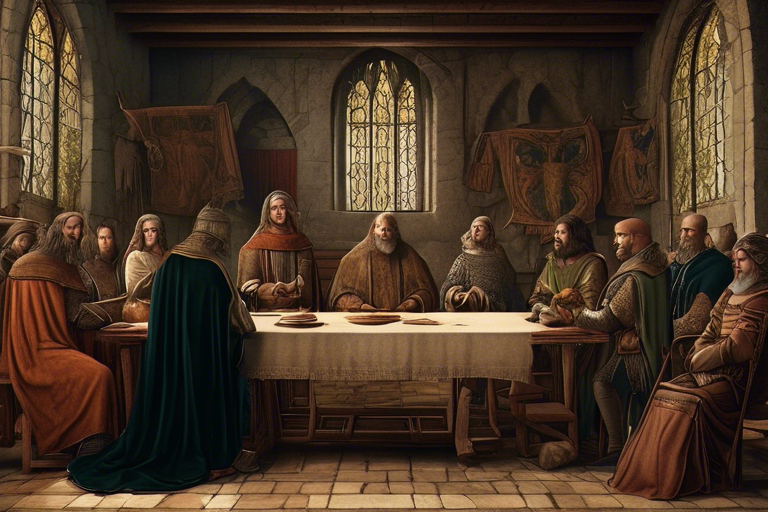Introduction
Medieval philosophy, also known as philosophy during the Middle Ages, is a fascinating subject that emerged in the period following the fall of the Western Roman Empire in the 5th century and continued until the Renaissance in the 13th and 14th centuries. During this time, philosophy faced challenges from religious faith, leading medieval philosophers to defend the purpose and existence of philosophy itself. This article will explore the characteristics, history, and major themes of medieval philosophy, shedding light on its relevance to modern problems.
Characteristics of Medieval Philosophy
Medieval philosophy is characterized by its heavy emphasis on the theological aspects of thought. Medieval thinkers, such as Thomas Aquinas and Averroes, often considered themselves defenders of faith against the claims of reason. However, they also utilized the methods and logical techniques of ancient philosophers to address theological questions and integrate sacred doctrine with secular learning. The principles underlying medieval philosophy include the use of logic, respect for ancient philosophers like Aristotle and Plato, and the coordination of philosophy with theological teachings.
One of the central debates during the medieval period was the relationship between faith and reason. Some philosophers, like Avicenna and Averroes, leaned more toward reason, while others, like Augustine, emphasized the importance of faith. Augustine famously stated that he would never allow his philosophical investigations to go beyond the authority of God. This tension between faith and reason shaped many of the discussions and developments in medieval philosophy.
Early Medieval Christian Philosophy
The early medieval period is a subject of debate among scholars, but it generally begins with Augustine of Hippo, who lived in the 4th and 5th centuries. During this time, Western Europe experienced a decline in knowledge and education, often referred to as the Dark Ages. However, monasteries served as centers of learning, preserving, and transmitting knowledge through texts.
Early Christian thought in the patristic period was characterized by its intuitive and mystical nature, relying less on reason and logical argumentation. The works of Plato, rather than Aristotle, had a significant influence, and philosophers sought to reconcile Plato’s ideas with Christian beliefs. Boethius, a Christian philosopher, translated and commented on the works of Aristotle, which introduced some Aristotelian concepts to the Latin-speaking world.
High Middle Ages
The high Middle Ages witnessed a revival of learning and the rediscovery of ancient philosophy. This period, beginning around the 12th century, saw the translation and study of Aristotle’s works, which had a profound impact on medieval thought. Scholars like Thomas Aquinas, John Duns Scotus, and William of Ockham engaged with Aristotelian philosophy and sought to integrate it with Christian theology.
One of the significant achievements of the high Middle Ages was the development of Scholasticism, a method of study that combined philosophy and theology. Scholastic thinkers, such as Aquinas, structured their works as disputation, presenting questions, objections, and replies. Aquinas, in particular, contributed to the development of metaphysics, natural theology, and ethics, producing monumental works like the “Summa Theologica.”
Topics in Medieval Philosophy
Medieval philosophy covered a wide range of topics, reflecting the interests and concerns of thinkers from different religious traditions. One prominent theme was the relationship between faith and reason. Philosophers explored the compatibility of philosophical reasoning with religious beliefs and attempted to prove the existence of God through rational arguments.
Metaphysics, the study of the nature of reality, was also a central focus of medieval philosophy. Scholars delved into questions about the nature of the soul, the existence of universals, and the problem of evil. They debated the limits of language in describing God and grappled with issues of time, space, and causation.
Ethics and political philosophy were subjects of great interest as well. Medieval thinkers pondered the nature of morality, the foundations of ethical principles, and the organization of a just society. They also discussed the relationship between the church and the state, reflecting on the roles and responsibilities of religious and secular authorities.
Major Thinkers in Medieval Philosophy
Medieval philosophy boasts a diverse array of thinkers who made significant contributions to the field. St. Augustine of Hippo, a pivotal figure in early Christian philosophy, explored topics such as free will, original sin, and divine grace. Thomas Aquinas, a Dominican friar, is widely regarded as one of the greatest medieval philosophers. His synthesis of Aristotelian philosophy and Christian theology profoundly influenced Western thought.
Other notable figures include Anselm of Canterbury, who formulated the famous ontological argument for the existence of God, and John Duns Scotus, known for his intricate metaphysical theories. Muslim philosophers, such as Avicenna and Averroes, left a lasting impact on medieval thought, particularly in the areas of metaphysics and philosophy of mind.
The Legacy of Medieval Philosophy
Despite the Renaissance’s rejection of many medieval ideas, the period laid the groundwork for future philosophical developments. The methods and logical language developed in medieval philosophy paved the way for advancements in fields like computer science and modal logic. The medieval exploration of metaphysics, ethics, and political philosophy continues to shape contemporary philosophical inquiries.
In conclusion, medieval philosophy emerged from a period of conflict between reason and faith. It encompasses a wide range of topics and themes, addressing the relationship between philosophy and theology. Throughout the centuries, numerous influential thinkers shaped the development of medieval philosophy, leaving a lasting legacy that still resonates today. By understanding the complexities and contributions of medieval philosophy, we gain valuable insights into our philosophical inquiries and the rich intellectual history of the Middle Ages.
